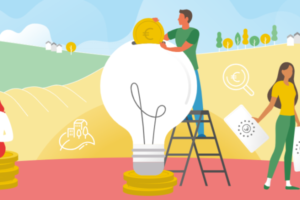 Today, the Commission launched a new interactive guide mapping all funding opportunities available at EU level for rural areas. EU funds and programmes that can foster sustainable growth and well-being in rural areas abound. However, identifying the most appropriate option is not always straightforward for potential beneficiaries. The Rural toolkit gathers funding opportunities from 26 different EU funds, from the Common Agricultural Policy to Cohesion Funds, Horizon Europe and the Recovery and Resilience Facility. In just a few clicks, rural entrepreneurs and local authorities can find out the best funding available to help them develop their project.
Today, the Commission launched a new interactive guide mapping all funding opportunities available at EU level for rural areas. EU funds and programmes that can foster sustainable growth and well-being in rural areas abound. However, identifying the most appropriate option is not always straightforward for potential beneficiaries. The Rural toolkit gathers funding opportunities from 26 different EU funds, from the Common Agricultural Policy to Cohesion Funds, Horizon Europe and the Recovery and Resilience Facility. In just a few clicks, rural entrepreneurs and local authorities can find out the best funding available to help them develop their project.
Category Archives: English news
“One Partnership. One Future.” – op-ed article by President António Costa
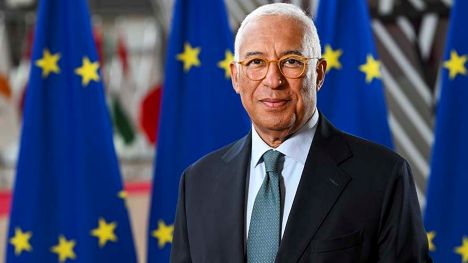 As Africa and Europe prepare for the 7th European Union–African Union Summit in Luanda, we stand shoulder to shoulder, drawing on the valuable lessons of our shared history, and with renewed joint ambitions firmly focused on the future. 2025 marks 25 years of EU-AU partnership and 50 years of Angola’s and many other African nations’ independence—milestones that remind us of how far we’ve come and how much more we can achieve together. Europe and Africa are bound by together in an increasingly fast-changing world that demands solidarity, innovation, and a common purpose.
As Africa and Europe prepare for the 7th European Union–African Union Summit in Luanda, we stand shoulder to shoulder, drawing on the valuable lessons of our shared history, and with renewed joint ambitions firmly focused on the future. 2025 marks 25 years of EU-AU partnership and 50 years of Angola’s and many other African nations’ independence—milestones that remind us of how far we’ve come and how much more we can achieve together. Europe and Africa are bound by together in an increasingly fast-changing world that demands solidarity, innovation, and a common purpose.
It’s all because of the weather – farmers to BBC
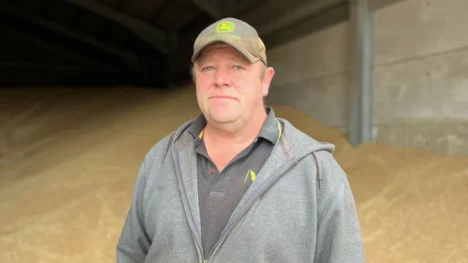 Farmers have blamed extreme wet weather followed by prolonged dry spells for a very poor harvest. Dan Willis, who runs a farm near Newbury, said the weather had been „horrific”. While George Brown, who also farms in West Berkshire, said he thought the conditions could lead to some farmers selling up. Provisional government figures for the 2025 English barley harvest showed a 14% decrease compared to last year, while spring barley had fallen 23% – written by the BBC.
Farmers have blamed extreme wet weather followed by prolonged dry spells for a very poor harvest. Dan Willis, who runs a farm near Newbury, said the weather had been „horrific”. While George Brown, who also farms in West Berkshire, said he thought the conditions could lead to some farmers selling up. Provisional government figures for the 2025 English barley harvest showed a 14% decrease compared to last year, while spring barley had fallen 23% – written by the BBC.
Commission launches strategy to enhance water security for people, economy and environment
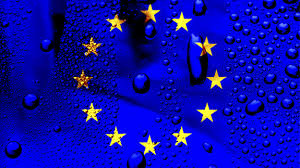 The Commission adopted the European Water Resilience Strategy aiming at restoring and protecting the water cycle, securing clean and affordable water for all and creating a sustainable, resilient, smart and competitive water-economy in Europe.
The Commission adopted the European Water Resilience Strategy aiming at restoring and protecting the water cycle, securing clean and affordable water for all and creating a sustainable, resilient, smart and competitive water-economy in Europe.
Ajinomoto Co., Inc., through its subsidiary Ajinomoto Health & Nutrition North America, Inc., Announces Gold Sponsorship of LabCentral: Accelerating Innovation in Biotechnology

Ikuo Kira
Ajinomoto Co., Inc., a global leader in biotechnology and food innovation, proudly announces its sponsorship of LabCentral, a premier launchpad for high-potential life sciences and biotech startups located in the heart of the Greater Boston biotechnology community. This partnership underscores the Ajinomoto Group’s commitment to fostering innovation, collaboration, and scientific advancement in this rapidly evolving sector and thriving ecosystem.
Science and Innovation Forum 2024: Digital Agriculture Changemakers in Action
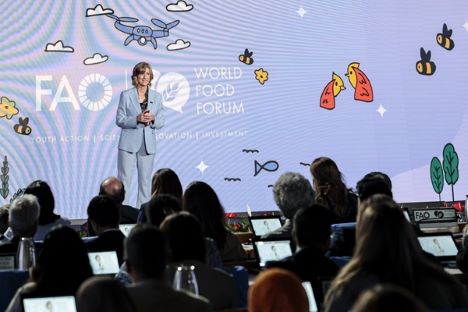 In remote rural areas, farmers are increasingly embracing digital innovation over traditional manual labor to overcome growing challenges like climate change, resource scarcity, and economic pressures. Smallholder farmers are becoming digital agriculture changemakers, adopting artificial intelligence (AI), blockchain, and precision farming to transform how food is grown, harvested, processed, and distributed. This transformation isn’t a distant promise; it’s already happening.
In remote rural areas, farmers are increasingly embracing digital innovation over traditional manual labor to overcome growing challenges like climate change, resource scarcity, and economic pressures. Smallholder farmers are becoming digital agriculture changemakers, adopting artificial intelligence (AI), blockchain, and precision farming to transform how food is grown, harvested, processed, and distributed. This transformation isn’t a distant promise; it’s already happening.
FAO Science and Innovation Forum Spotlighted Inclusive AI for Agrifood Systems Transformation
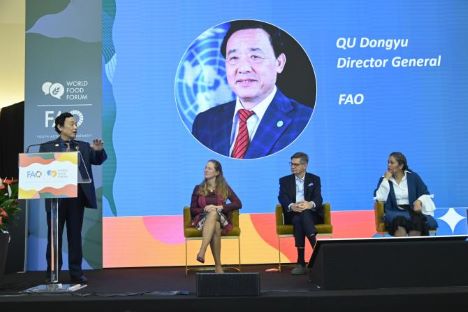 Artificial intelligence (AI) has been heralded as one of the most transformative technologies of the twenty first century, offering the potential to revolutionize industries across the globe. In the agrifood sector, AI holds promise, with applications that range from precision farming techniques that optimize water and fertilizer use to advanced supply chain management that reduces waste and improves efficiency. However, for all its potential, AI also presents challenges, particularly around inclusivity. As with many technological advances, those who stand to benefit the most are often the least able to access the necessary tools, infrastructure, and education. This digital divide risks leaving behind marginalized communities, particularly in rural areas where food insecurity is most acute.
Artificial intelligence (AI) has been heralded as one of the most transformative technologies of the twenty first century, offering the potential to revolutionize industries across the globe. In the agrifood sector, AI holds promise, with applications that range from precision farming techniques that optimize water and fertilizer use to advanced supply chain management that reduces waste and improves efficiency. However, for all its potential, AI also presents challenges, particularly around inclusivity. As with many technological advances, those who stand to benefit the most are often the least able to access the necessary tools, infrastructure, and education. This digital divide risks leaving behind marginalized communities, particularly in rural areas where food insecurity is most acute.
Innovative Spanish farmer supplies tasty lamb to the whole world
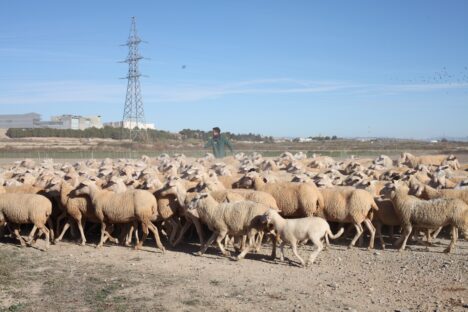 Spain accounts for more than a quarter of sheep meat production in the European Union (EU). About 10 percent is produced by farmers in Aragon. One of the members of a lamb cooperative there is the innovative sheep farmer Antonio Enfedaque. Nieuwe Oogst visited his company in November.
Spain accounts for more than a quarter of sheep meat production in the European Union (EU). About 10 percent is produced by farmers in Aragon. One of the members of a lamb cooperative there is the innovative sheep farmer Antonio Enfedaque. Nieuwe Oogst visited his company in November.
Fertilizer use fell in Hungary
 Fertiliser distributors sold 1.08 million tonnes of fertiliser directly to farmers in 2023. The volume sold was 18.8 per cent less than a year earlier.
Fertiliser distributors sold 1.08 million tonnes of fertiliser directly to farmers in 2023. The volume sold was 18.8 per cent less than a year earlier.
Fighting against unfair trading practices: European Commission gathers views from farmers and operators in the food supply chain
 The European Commission is calling farmers and all smaller suppliers across the food supply chain to share their views on their experience with unfair trading practices. A survey is currently available online in all EU languages until 15 March 2024. During the recent weeks farmers and their associations raised concerns about prevalence of unfair practices within the food supply chain. By participating in the survey, farmers and smaller suppliers can express their concerns and share their experience with unfair trading practices. After presenting options for simplification to reduce the burden for EU farmers, the Commission is also working on actions to improve the position of farmers in the food chain and to improve the enforcement against unfair trading practices.
The European Commission is calling farmers and all smaller suppliers across the food supply chain to share their views on their experience with unfair trading practices. A survey is currently available online in all EU languages until 15 March 2024. During the recent weeks farmers and their associations raised concerns about prevalence of unfair practices within the food supply chain. By participating in the survey, farmers and smaller suppliers can express their concerns and share their experience with unfair trading practices. After presenting options for simplification to reduce the burden for EU farmers, the Commission is also working on actions to improve the position of farmers in the food chain and to improve the enforcement against unfair trading practices.
The European Commission presents options for simplification to reduce the burden for EU farmers

Slovak farmers arrive to Kosice on February 22, 2024
Today, the European Commission sent a paper to the Belgian Presidency outlining first possible actions to help reduce the administrative burden weighing on farmers’ shoulders. The document, which will be discussed with Member States in the agricultural Council of 26 February, lists a range of short- and mid-term actions that can be taken to achieve simplification. This will serve as the basis for discussions and joint action with EU countries.
Commission invests over €233 million in Strategic Environment and Climate Projects across Europe
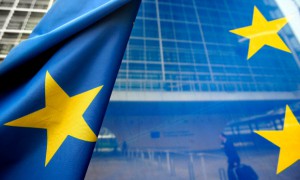 Today, the Commission is investing over €233 million in twelve new Strategic Projects across Europe under the LIFE programme to support the implementation of the EU’s environmental and climate ambitions under the European Green Deal. These Strategic Projects are expected to mobilise substantial additional funds from other EU sources, including agricultural, structural, regional and research funds, as well as from national governments and private sector investment.
Today, the Commission is investing over €233 million in twelve new Strategic Projects across Europe under the LIFE programme to support the implementation of the EU’s environmental and climate ambitions under the European Green Deal. These Strategic Projects are expected to mobilise substantial additional funds from other EU sources, including agricultural, structural, regional and research funds, as well as from national governments and private sector investment.
Commission presents recommendation for 2040 emissions reduction target to set the path to climate neutrality in 2050
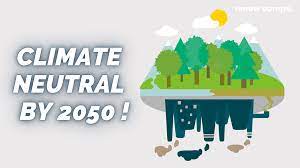 The Commission has published a detailed impact assessment on possible pathways to reach the agreed goal of making the European Union climate neutral by 2050. Based on this impact assessment, the Commission recommends a 90% net greenhouse gas emissions reduction by 2040 compared to 1990 levels, launching a discussion with all stakeholders; a legislative proposal will be made by the next Commission, after the European elections, and agreed with the European Parliament and Member States as required under the EU Climate Law. This recommendation is in line with the advice of the European Scientific Advisory Board on Climate Change (ESABCC) and the EU’s commitments under the Paris Agreement.
The Commission has published a detailed impact assessment on possible pathways to reach the agreed goal of making the European Union climate neutral by 2050. Based on this impact assessment, the Commission recommends a 90% net greenhouse gas emissions reduction by 2040 compared to 1990 levels, launching a discussion with all stakeholders; a legislative proposal will be made by the next Commission, after the European elections, and agreed with the European Parliament and Member States as required under the EU Climate Law. This recommendation is in line with the advice of the European Scientific Advisory Board on Climate Change (ESABCC) and the EU’s commitments under the Paris Agreement.
The European Commission approves a new geographical indication for France, „Sel de Camargue” / „Fleur de sel de Camargue”
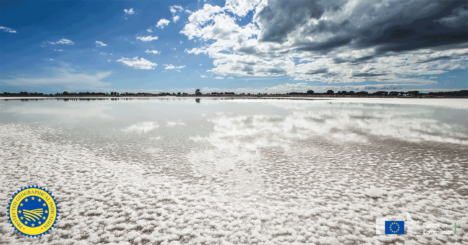 The European Commission approved the inclusion in the register of protected geographical indications (PGI) of „Sel de Camargue”/””, a salt from the Petite Camargue geographical area.
The European Commission approved the inclusion in the register of protected geographical indications (PGI) of „Sel de Camargue”/””, a salt from the Petite Camargue geographical area.
Meeting between farmers and Ursula von der Leyen, President of the European Commission – VIDEO
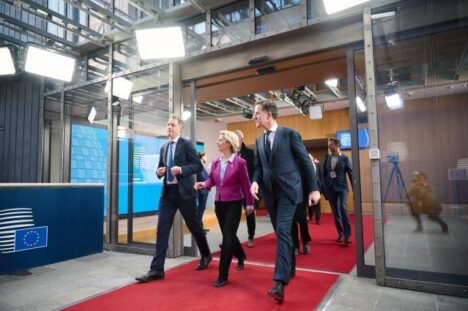 Doorstep by Ursula VON DER LEYEN, President of the European Commission, and roundtable, with Alexander DE CROO, Belgian Prime Minister, and Mark RUTTE, Dutch Prime Minister. Weblink: https://audiovisual.ec.europa.eu/en/video/I-252547
Doorstep by Ursula VON DER LEYEN, President of the European Commission, and roundtable, with Alexander DE CROO, Belgian Prime Minister, and Mark RUTTE, Dutch Prime Minister. Weblink: https://audiovisual.ec.europa.eu/en/video/I-252547
EU reaffirms trade support for Ukraine and Moldova
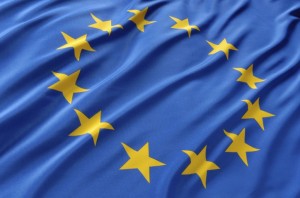 The Commission has today proposed to renew the suspension of import duties and quotas on Ukrainian exports to the EU for another year, while reinforcing protection for sensitive EU agricultural products.
The Commission has today proposed to renew the suspension of import duties and quotas on Ukrainian exports to the EU for another year, while reinforcing protection for sensitive EU agricultural products.










